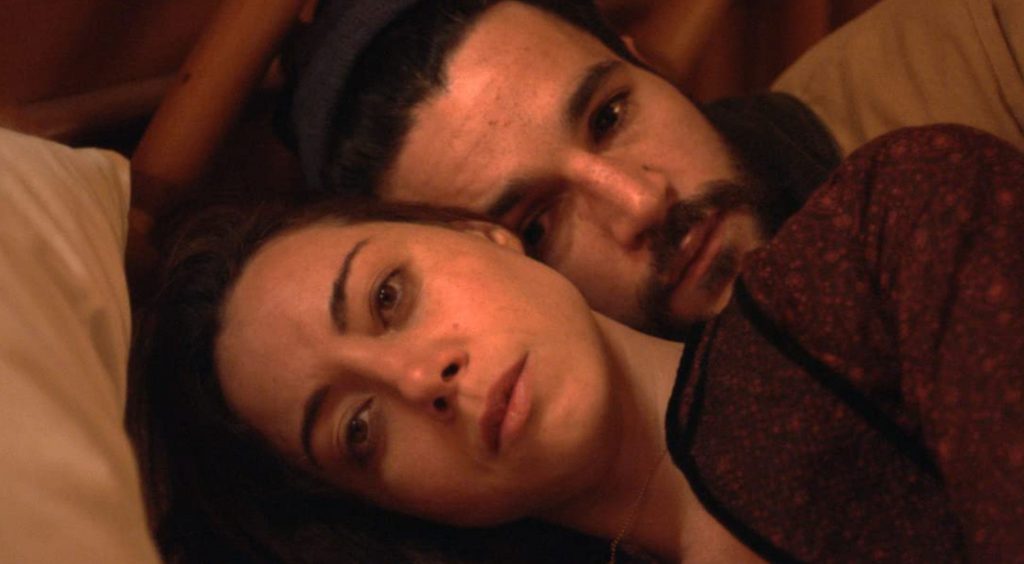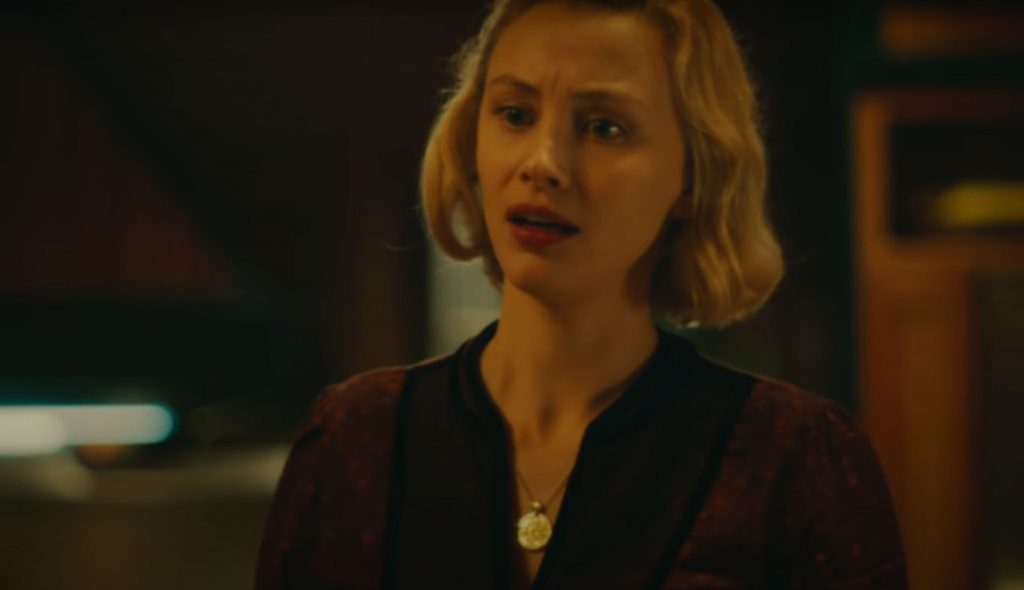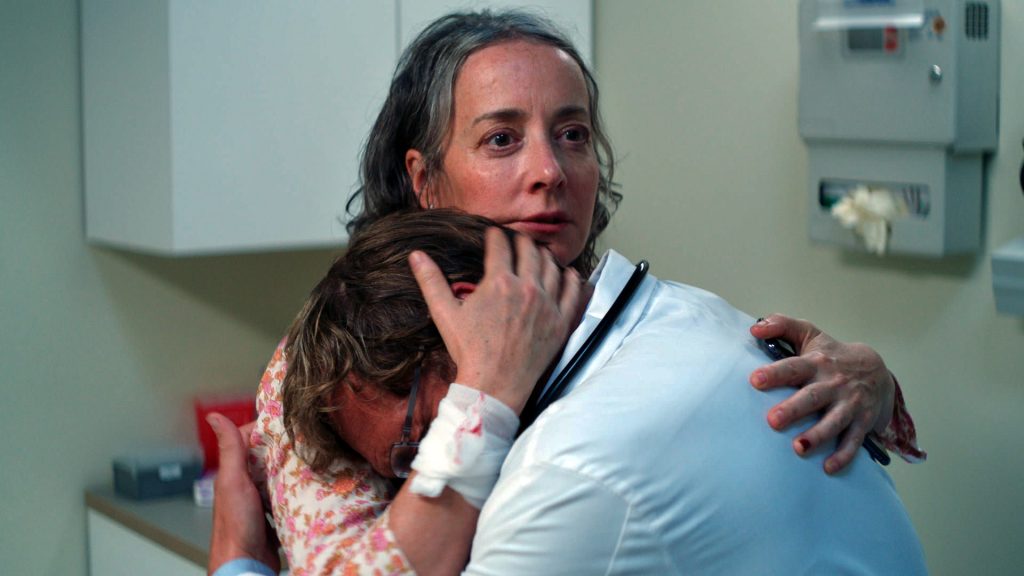January 9, 2021
by Carla Hay

Directed by Lawrence Michael Levine
Culture Representation: Taking place in upstate New York, the dramatic film “Black Bear” features a predominantly white cast (with a few African Americans, Asians and Latinos) representing the middle-class.
Culture Clash: A woman with apparent emotional problems is at the center of chaos during a potential love triangle.
Culture Audience: “Black Bear” will appeal primarily to people who like well-acted independent films that make people question what is real in the story and what might be the imagination of a character in the story.

People who prefer movies with a straightforward narrative probably won’t like “Black Bear” very much, because the movie is divided into two very distinct stories, with one abruptly transitioning into the other without any explanation until the last few minutes of the movie. The three main actors in the movie portray different characters with the same names in each story. And this switch in characters might confuse viewers. Written and directed by Lawrence Michael Levine, “Black Bear” is nonetheless worth watching for anyone who wants to see some good acting with compelling dialogue, even if the movie is somewhat erratic.
That uneven tone is because the movie’s first story, titled “Part One: The Bear in the Road,” is much better than the second story, titled “Part Two: The Bear by the Boat House.” Each story takes place at a lake house in the same wooded area in an unnamed part of upstate New York. (“Black Bear” was actually filmed in Long Lake, New York.) In each story, someone hears bear noises nearby. And then, a black bear shows up at a pivotal moment.
Each story begins with a scene of a woman (played by Aubrey Plaza) wearing a red one-piece swimsuit, looking contemplative and sitting cross-legged on a pier, with mist swirling around her. She then goes into a nearby house, sits down at a table, and opens what looks like a journal. Is this real or is it a dream?
In “The Bear in the Road” story, viewers find out that the woman is named Allison, an independent filmmaker who has rented the cabin-styled house as a retreat space to get over her writer’s block. Or so she says. Allison, who is also an actress, became a film director somewhat out of necessity because, as she says a little later in the story, she didn’t quit acting; she just stopped getting hired as an actress.
Allison is renting the house from an unmarried couple named Gabe (played by Christopher Abbott) and Blair (played by Sarah Gadon), who used to live in Brooklyn but the couple moved to upstate New York because they could no longer afford to live in Brooklyn. Gabe owns the house, which has been in his family for years. Blair is pregnant with her and Gabe’s first child together, and Blair is in her third trimester. There’s simmering tension between Blair and Gabe that eventually boils over to the surface.
Gabe is the one who greets Allison when she arrives at the house. It’s their first time meeting each other. And from the get-go, it’s obvious that Gabe and Allison are attracted to each other. Allison and Gabe have a mutual friend named Mike (who is not seen in the movie), who has told Gabe that Allison is married. When Gabe asks Allison why her husband isn’t with her, Allison tells Gabe that she doesn’t have a husband.
Blair notices the way that Gabe has been looking at Allison. And so, when Gabe introduces Allison to Blair, one of the first things that Allison says to Blair is that Blair is pretty, while Blair returns the compliment. Astute viewers will notice that this is Allison’s way of trying to dispel any insecurities that Blair might be feeling about Allison being an attractive stranger who has caught Gabe’s attention. Ironically, Allison later tells Gabe that she doesn’t like getting compliments about herself.
Gabe, Blair and Allison have dinner together during Allison’s first night at the house. What starts out as a polite “let’s get to know each other” gathering turns into a highly emotional standoff with Gabe and Blair arguing and Allison being somewhat caught in the middle. During this tension-filled situation, viewers find out that Blair has issues with Gabe’s chosen profession as a musician. Because he makes very little money as a musician, Blair doesn’t think Gabe should call himself a “professional” musician. He’s very defensive about it in a way that he thinks any criticism that Blair makes about his career is a direct attack on his masculinity.
Blair also announces to Allison that Gabe believes in traditional gender roles, which Gabe denies. Blair frequently accuses Gabe of being sexist, which he also denies. However, Gabe admits that he has this belief: “The erosion of traditional communities is part of why things are so chaotic right now. I’m not saying feminism is bad.”
During this escalating agitation between Gabe and Blair, there are hints that Allison wants to take Gabe’s side. When Blair berates Gabe for supposedly being against feminism, Allison chimes in by saying that feminism is “fucked up.” Allison and Gabe also seem to have the same sense of humor, because she laughs at Gabe’s jokes that Blair thinks are silly.
While Gabe and Blair are working out their relationship issues in this very hostile way, they also try to get a read on Allison, who comes across as someone who is mysterious and might not always be telling the truth about herself. At one point in the conversation, when Allison mentions that she never learned how to cook, Blair asks her in a surprised tone of voice why Allison’s mother never taught her how to cook. This is the same Blair who insults Dave for believing in traditional gender roles, even though Blair obviously assumes all women should know how to cook. Can you say “hypocrisy”?
Allison’s reply is to tell Blair that Allison’s mother died when she was a child. Instead of expressing remorse at her thoughtless comment, Blair continues to pick apart Gabe and then turns some of her vitriol on Allison too. When Allison says that she doesn’t think about her films after she makes them, Blair accuses Allison of being “selfish.” When Gabe accuses Blair of not letting him have his own thoughts, Blair responds by saying: “It’s not that I can’t stand that you have thoughts about the world. It’s that I can’t stand the thoughts about the world that you have.”
Meanwhile, Gabe chastises Blair for drinking wine during the dinner. He believes that Blair shouldn’t be drinking any alcohol during her pregnancy, while Blair thinks he’s being unreasonable and that a little wine won’t hurt the baby. Of course, their arguing isn’t really about the wine but about their conflicting outlooks on life. And their impending parenthood has forced Blair and Gabe to think about how they are going to raise their child when they can’t even agree on how they should live as a couple.
It’s later revealed that Blair is probably feeling very insecure because the pregnancy was unplanned and she might be thinking that Gabe is only staying in the relationship because of the child. And now, Allison has come into the picture, and a very pregnant Blair can’t help but notice that there’s a mutual spark between Gabe and Allison. It comes as no surprise that Blair begins to have doubts over whether or not Gabe still loves her. Before this story is over, some secrets are revealed, and there’s some more messy drama that leads to a big confrontation.
“The Bear by the Boat House” story has more characters but it’s not as interesting as “The Bear in the Road” story. In “The Bear by the Boat House,” Allison is now a character who is an actress who’s been married for six years to a director named Gabe. The story takes place on the last day of a film shoot of a movie that they are doing together. The name of the movie is “Black Bear.” It’s being filmed at the same pier and house that were in “The Bear in the Road” story.
In “The Bear by the Boat House” story, Allison (not Blair) is the character who is very emotionally fragile with jealousy tendencies, while Blair is a self-assured co-star in the film who might or might not be the third person in a love triangle. There’s sexual tension between Gabe and Blair. Gabe wants Allison to think that he’s having an affair with Blair so that he can get the necessary emotions out of Allison in their last day of making the movie.
Blair is in cahoots with Gabe over this emotional manipulation. There are scenes of Gabe and Blair having secret meet-ups in hushed voices to plot how they can trick Allison and possibly other people on the film set into thinking that Gabe might be cheating on Allison with Blair. Gabe and Blair plan it in such detail that they decide in advance how to look at each other and when to exit and leave the room, to make it look like they’re trying to cover up an affair.
Blair seems to feel a little bit guilty over these mind games, but in the end, she gleefully goes along with this scheme because she wants Gabe’s approval. Gabe has already been showing obvious favoritism to Blair on the film set, in order to plant the seeds of jealousy in Allison’s mind. Gabe also belittles Allison on the film set, in order to make her feel even more insecure.
The emotional distress is too much for Allison, and it leads to a long, drawn-out sequence where she gets stoned on an unnamed drug and has a hard time completing the last scene that they have to film. Gabe didn’t expect this damper on his carefully laid plan. Viewers will then have to wonder if Allison can finish the movie in the way Gabe wanted and if Gabe will tell Allison the truth about how he manipulated her.
Some of the members of the film crew who are caught up in this drama include a script supervisor named Nora (played by Jennifer Kim), a production assistant named Cahya (played by Paola Lázaro) and a cinematographer named Baako (played by Grantham Coleman). Plaza has some over-the-top melodramatics in this story, but she handles it with a certain authenticity so that it doesn’t go off the rails into becoming a campy performance. There are indications that the Allison character in this story has some underlying issues with mental health that can’t be blamed on Allison’s drug use.
“Black Bear” the movie (not the movie within the movie) is essentially a showcase for Plaza’s dramatic range as an actress. Plaza, who is one of the producers of “Black Bear,” is mostly known for her roles in comedies, but she is a clear standout in expressing the wide gamut of emotions that she does in “Black Bear.” Each “Allison” is at the center of the chaos in each story, but these two Allison characters are very different from each other. The Allison in the first story is a manipulator who likes to be in control, while the Allison in the second story is the one who’s being manipulated and is out of control.
Gadon also gives an impressive performance in her role as the shrewish Blair in “The Bear in the Road” story, but the Blair character in “The Bear by the Boat House” is unfortunately quite bland. Abbott’s Gabe character is also more nuanced and more interesting in “The Bear in the Road” story, whereas the Gabe character in “The Bear by the Boat House” doesn’t have much character development beyond being a conniving and selfish person.
“Black Bear” should be given a lot of credit for attempting not to be a typical “mumblecore” independent film, which is what it first appears to be if people judged the movie by its trailer. “The Bear in the Road” story crackles with energy because the characters and dialogue are written so well. However, “Black Bear” falls a little flat in the second half in “The Bear by the Boat House” story, because Allison’s meltdown becomes a little too repetitive and predictable.
Plaza’s acting talent shines throughout the movie, but the way that “The Bear by the Boat House” is written could have been improved by giving more depth to the characters of Gabe and Blair, who come across as very shallow in that story. People who have the patience to sit through this movie to find out what it all means will at least get answers to some questions in the last five minutes of the film. However, “Black Bear” still has enough “fill in the blank” moments that give viewers the freedom to interpret the movie in a variety of ways.
Momentum Pictures released “Black Bear” in select U.S. cinemas and on digital and VOD on December 4, 2020.


